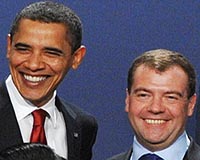| . |  |
. |
Washington (UPI) May 8, 2009 According to a simplistic but powerful pair of contrasting stereotypes that are increasingly held on both sides of the Atlantic, but especially in the 27-nation European Union, 21st century Europe is about multilateralism and engagement, but the United States remains fixated upon applying coercion through the exercise of military power, whatever the ostensible political purposes of the exercise. This idea that raw power does not succeed -- whereas soft power yields better fruits, better relations and a smoother world -- is not new. But it had its best moments in the early phases of the United States' military involvement in Iraq after April 2003. Over the nearly four years that followed, President George W. Bush's ill-advised -- according to most European and other critics -- or even criminal, according to some, Iraq enterprise seemed to be heading for failure. The term "debacle" was widely used to describe it on both sides of the Atlantic. From April 2003 to January 2007, the history of U.S. involvement in Iraq seemed to present conclusive evidence that military power was a thing of the past. The phrase was increasingly heard in European capitals that "there are no military solutions to essentially political problems." The lesson European policymakers and pundits drew from the U.S. armed forces' increasing difficulties in Iraq was a simple and straightforward one. It can be paraphrased as follows: "You primitive Americans want to use brute force to impose your own idea of change on people who not only disagree with you but who fiercely resist this imposition. Raw power, military power, therefore is not only horrible in terms of the destruction and the casualties that it creates, but it also futile. It just does not work." Therefore, the argument continued, it would be far better for prosperous Western industrialized democracies like the United States, Canada and the nations of the European Union to forget about military options and convert to applying the principles of soft power that are already being applied around the world by the European Commission in Brussels. Thus, through the application of engagement and dialogue, with the added spice of commerce and, consequently, enhanced prosperity for all as the clear endgame, the international community will have a far better chance to resolve the issues that the deployment of military force can only exacerbate. However, while it is easy enough to criticize the modalities in which American raw, military power has been used in Iraq, the fact remains that those forces were applied and that mistakes were indeed made. Part 3: Why European policymakers think their economic influence has supplanted the need for projecting military force around the world (Paolo Liebl von Schirach is the editor of SchirachReport.com, a regular contributor to Swiss radio and an international economic-development expert.) (United Press International's "Outside View" commentaries are written by outside contributors who specialize in a variety of important issues. The views expressed do not necessarily reflect those of United Press International. In the interests of creating an open forum, original submissions are invited.) Share This Article With Planet Earth
Related Links Learn about the Superpowers of the 21st Century at SpaceWar.com Learn about nuclear weapons doctrine and defense at SpaceWar.com
 Obama 'hopeful' of improving US-Russian ties
Obama 'hopeful' of improving US-Russian tiesWashington (AFP) May 7, 2009 President Barack Obama said Thursday he was "hopeful" of improving ties between Washington and Moscow as the chief US and Russian diplomats vowed to put nuclear arms control above their row in Georgia. Obama took the unusual step of holding a full meeting with visiting Foreign Minister Sergei Lavrov as he works to repair US-Russian relations battered by a string of disputes late in the admin ... read more |
|
| The content herein, unless otherwise known to be public domain, are Copyright 1995-2009 - SpaceDaily. AFP and UPI Wire Stories are copyright Agence France-Presse and United Press International. ESA Portal Reports are copyright European Space Agency. All NASA sourced material is public domain. Additional copyrights may apply in whole or part to other bona fide parties. Advertising does not imply endorsement,agreement or approval of any opinions, statements or information provided by SpaceDaily on any Web page published or hosted by SpaceDaily. Privacy Statement |